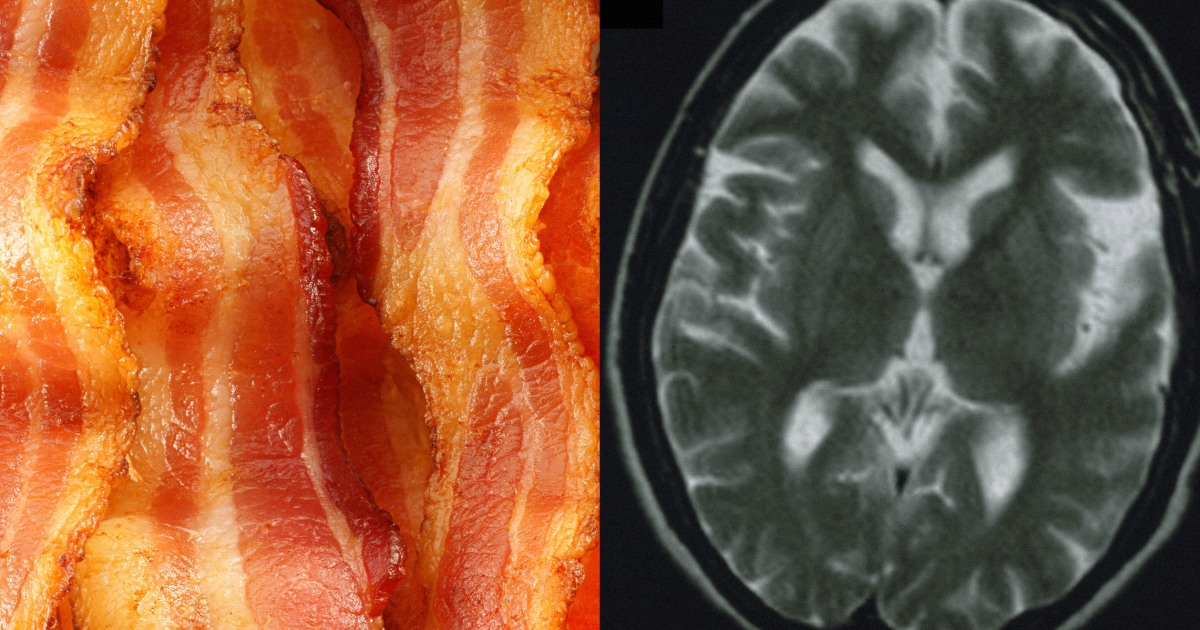Research shows a connection between processed red meat consumption and an elevated risk of developing dementia. This study spanned over four decades and involved over 130,000 participants and it was presented at the Alzheimer’s Association International Conference in Philadelphia.

Also Read: New Alzheimer’s Blood Test Shows 90% Accuracy in Detecting Early Dementia
The study found that consuming about one ounce of processed red meat per day (equivalent to nearly two 3-ounce servings per week) was associated with a 14% increase in dementia risk.
This category of meat includes products like bacon, sausage, hot dogs and deli meats, which are high in sodium, nitrates and saturated fats.
These meats have been linked not only to dementia but also to other chronic conditions like colon cancer, type 2 diabetes, heart disease and stroke.
The study tracked the dietary habits of over 130,000 health care professionals, including nurses, over 43 years. Participants provided data on their diet every 2 to 5 years, detailing their consumption of processed red meat, nuts, legumes and other foods.
More than 11,000 cases of dementia were identified during the follow-up period.
Participants who replaced a small daily serving of processed red meat with nuts and legumes saw a 20% reduction in dementia risk.
Foods such as peanuts, walnuts, beans, lentils and soy products offer anti-inflammatory benefits and are rich in protein, good fats and fiber which support overall brain health.
Each additional serving of processed meat was associated with further cognitive decline equating to 1.61 years of cognitive aging in general cognition and 1.69 years in verbal memory.
Consuming at least two servings per week of processed red meat such as bacon, hot dogs, sausages and deli meats was associated with a 14% increased risk of dementia compared to those who consumed fewer than three servings per month.
Each additional daily serving of processed red meat was linked to an equivalent of 1.6 years of cognitive aging, particularly affecting language abilities and executive functions.
Processed Red Meat includes meats that have been preserved by smoking, curing, salting or adding preservatives such as nitrites and high levels of sodium.
Unprocessed Red Meat includes meats like ground beef or steak, which were not linked to the same cognitive harms in the study.
Dr. Maria Carrillo from the Alzheimer’s Association addressed that unprocessed red meat, when consumed in moderation did not exhibit the same risks.
Processed red meats contain high levels of harmful substances such as nitrites and sodium, which may contribute to increased dementia risk.
These substances are known to have effects on the body and brain. Besides dementia, processed red meat has been linked to higher risks of cancer, heart disease and type 2 diabetes.
Replacing one daily serving of processed red meat with healthier options like nuts, beans or tofu can lower the risk of dementia by 23%.
These alternatives provide essential nutrients, including fiber, vitamins and minerals, which are important for maintaining brain health.
Also Read: Lenacapavir: HIV Vaccine Could Cost as Little as $40 Per Year for Patients
These meats often contain ingredients not typically found in home kitchens such as soy protein isolate, high fructose corn syrup and artificial additives.
Ultraprocessed foods make up a huge portion of the American diet contributing to obesity, diabetes and other health issues.
High levels of sodium, nitrates and saturated fats in processed meats can cause inflammation and oxidative stress in the body, which are detrimental to brain cells.
Ultraprocessed foods including sugary drinks, flavored yogurts, instant soups and many cereals, have been linked to increased dementia risk.
A study in Brazil indicated that people consuming 20% or more of their daily calories from ultraprocessed foods experienced faster cognitive decline.
Research in the UK showed a 25% increase in dementia risk for every 10% rise in ultraprocessed food consumption.
A similar study in the US found a 16% higher risk of cognitive impairment associated with greater processed food intake.
Conditions like hypertension, obesity and diabetes are associated with high intake of ultraprocessed foods and can damage blood vessels.
The brain relies heavily on healthy blood flow; any compromise can lead to increased vulnerability to cognitive issues and strokes.
Diets high in ultraprocessed foods often lack essential nutrients found in fresh fruits, vegetables and whole grains.
Healthy foods provide antioxidants and flavonoids that reduce brain inflammation and oxidative stress promoting better cognitive health.
Harmful compounds formed during the processing of these foods can accumulate in the brain leading to cell damage and increased inflammation.
The World Health Organization estimates that over 55 million people worldwide currently live with dementia with nearly 10 million new cases diagnosed annually. By 2050, the number of people living with dementia is expected to triple to 153 million.
Also Read: Nipah Virus: Kerala Takes Preventive Measures After Teenager Dies























